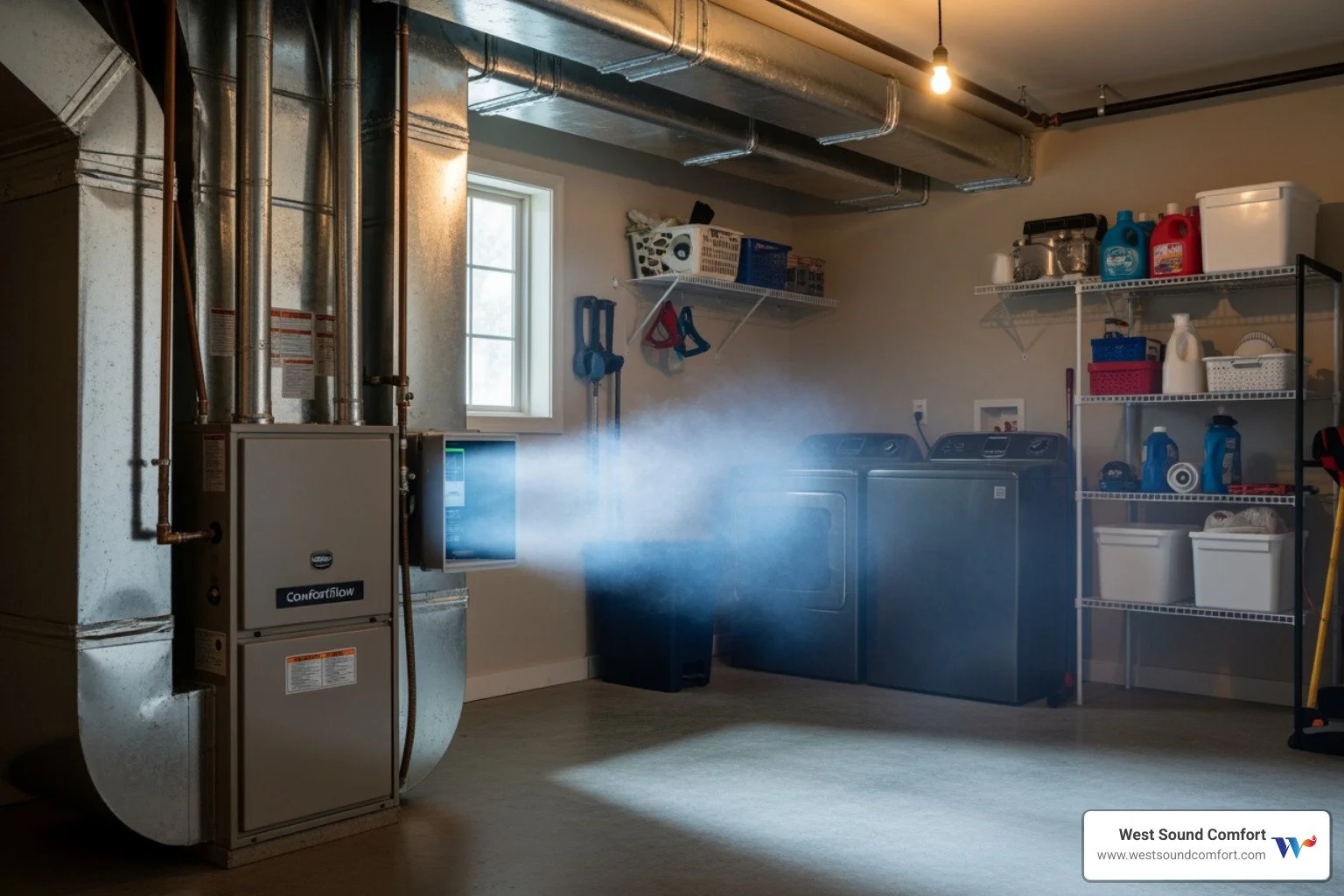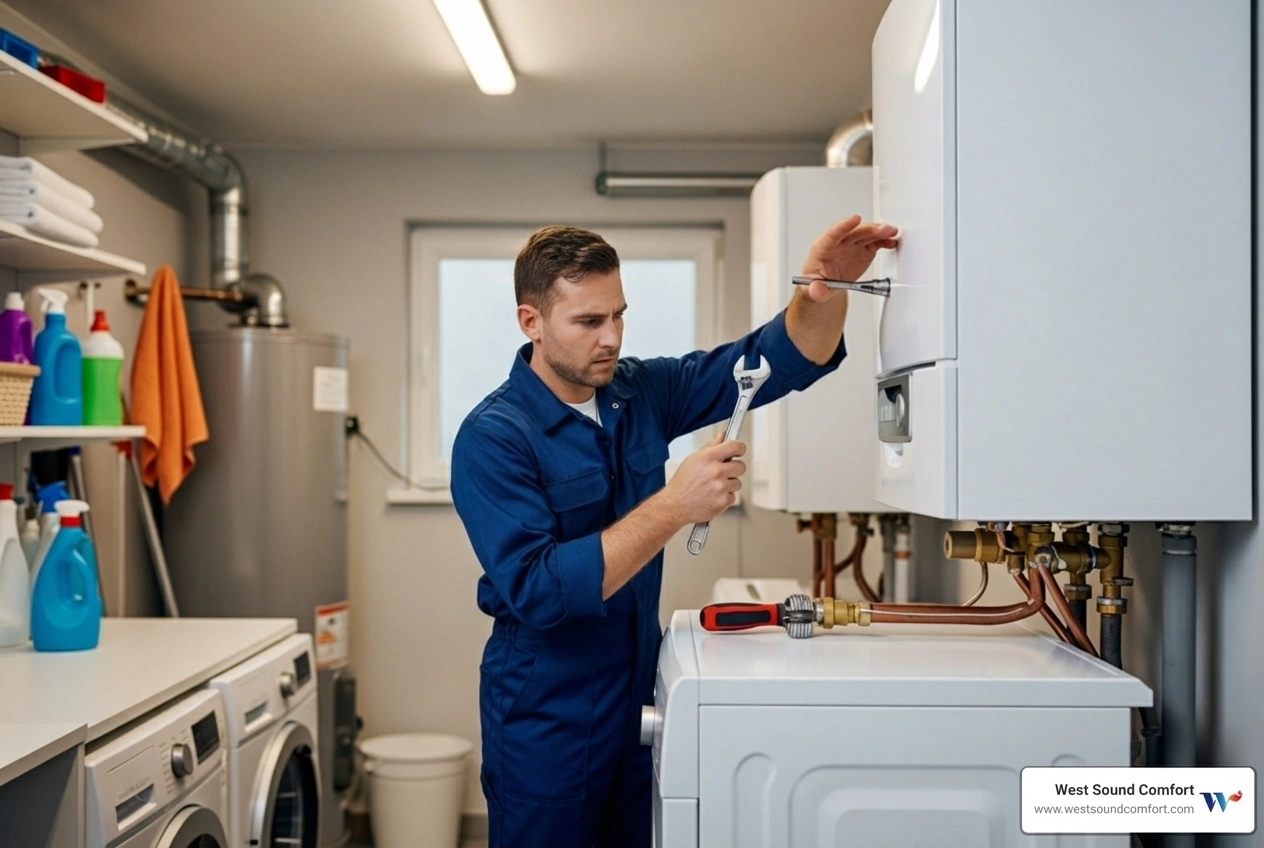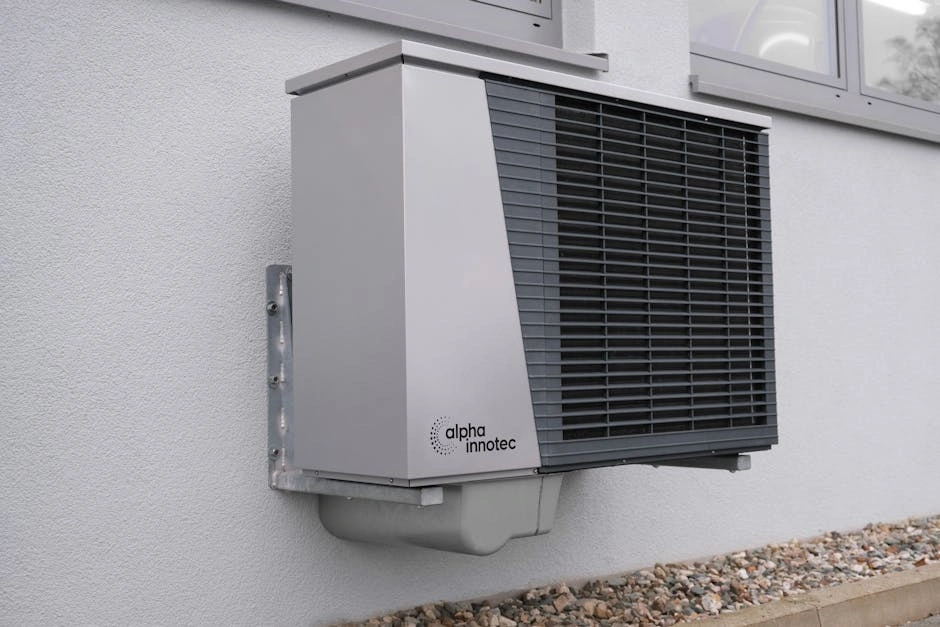Why Your Furnace Blowing Cold Air in Tahuya, WA Needs Immediate Attention

When you're dealing with a furnace blowing cold air in Tahuya, WA, it's a major disruption to your comfort during the chilly Pacific Northwest months. A heating system that fails to deliver warmth is the last thing you need. Fortunately, many furnace issues have simple causes you can check yourself before calling for professional help.
Quick Troubleshooting Checklist:
- Check your thermostat - Make sure it's set to HEAT and the fan is on AUTO, not ON.
- Inspect your air filter - A clogged filter is a top cause of furnace problems.
- Look at your pilot light or ignitor - For gas furnaces, verify the pilot is lit.
- Open all vents - Closed registers can cause the system to overheat.
- Listen for unusual sounds - Banging or clicking may signal component failure.
- Check for standing water - This could indicate a clogged condensate line.
For comprehensive heating solutions, explore our HVAC services, or if you need immediate assistance, contact West Sound Comfort for expert furnace repair in Tahuya.
This guide covers the most common reasons for a furnace blowing cold air, from simple fixes to knowing when to call a professional. A reliable furnace is essential in Tahuya's climate, so let's get your heating system working again.
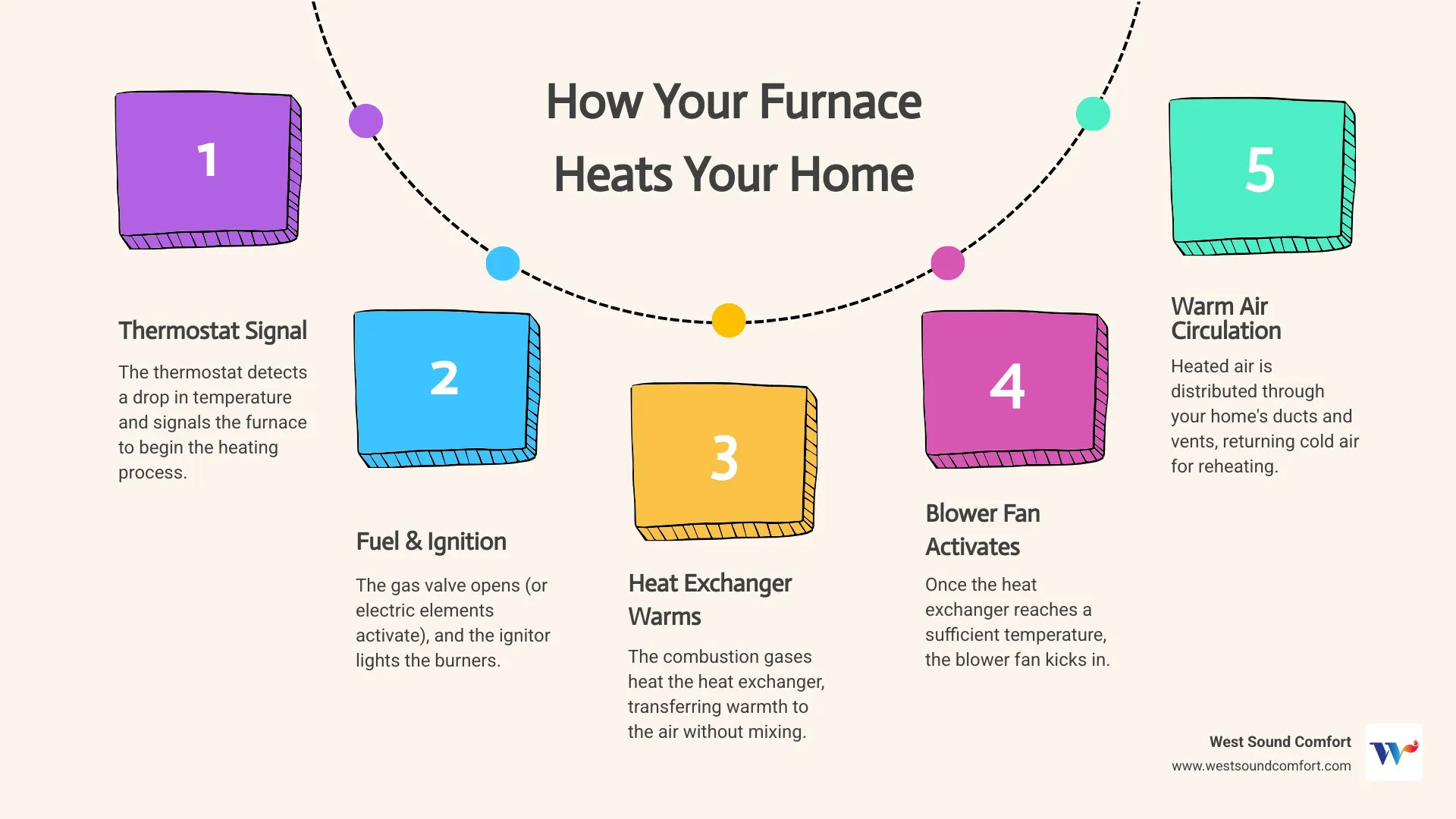
First Steps: Simple DIY Checks for Your Furnace
Before calling for help with a furnace blowing cold air in Tahuya, WA, try these simple checks. Often, the fix is easier than you think and can restore warmth in minutes.
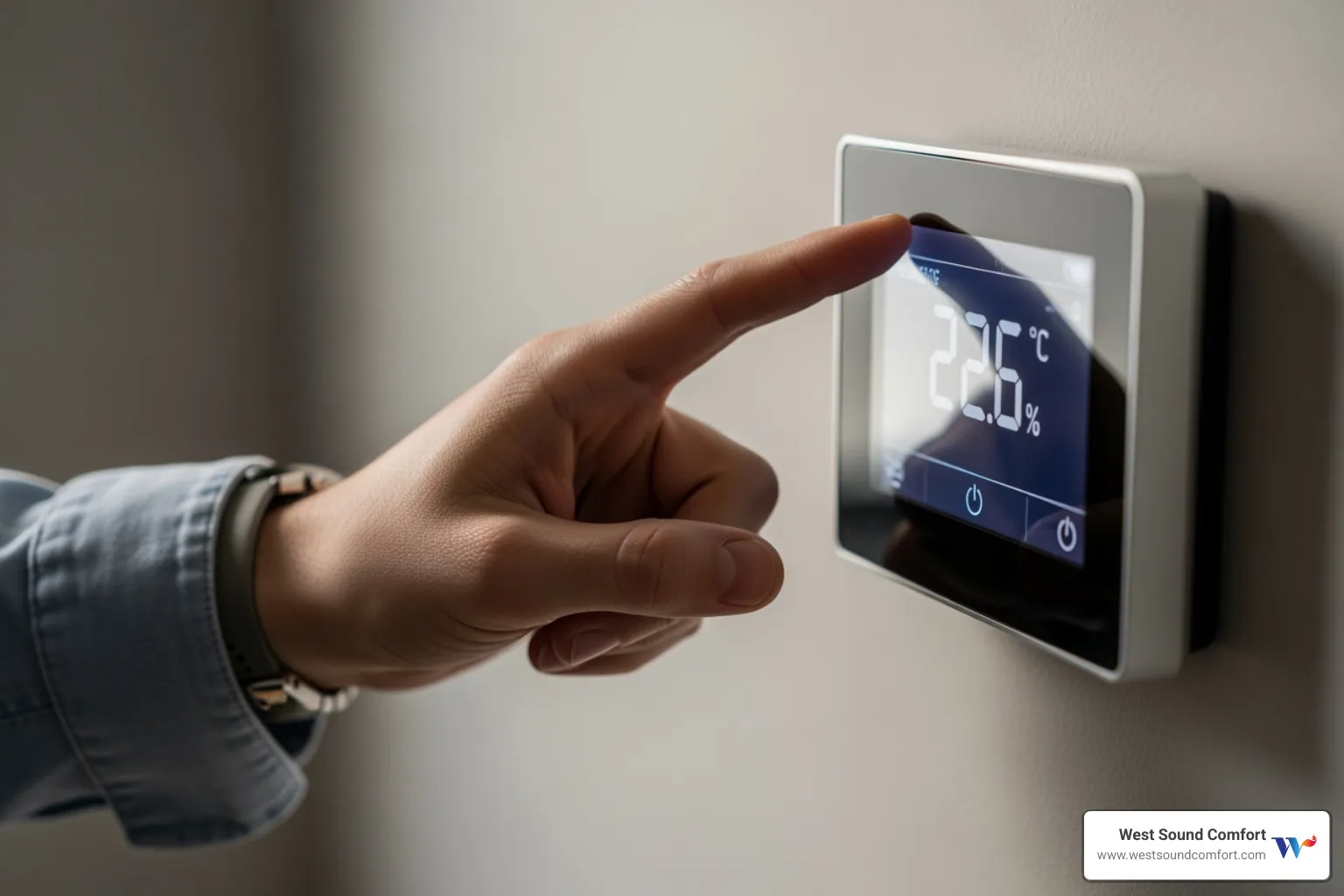
Check Your Thermostat Settings
Thermostats are a common source of heating problems, as accidental changes to settings can leave you shivering. First, ensure your thermostat is set to HEAT, not COOL. It's a simple but common mistake.
Next, check the fan setting. If it's ON, the fan runs constantly, circulating unheated air between cycles. Setting it to AUTO ensures the fan only runs when the furnace is producing heat, which often solves the mystery of a furnace blowing cold air in Tahuya, WA.
If you have a programmable thermostat, double-check the schedule, as settings can shift after power outages or time changes.
Inspect and Replace Your Air Filter
A clogged air filter is a small part that causes big problems. It restricts the airflow your furnace needs to work correctly. Restricted airflow makes the heat exchanger overheat, causing a safety switch to shut down the burners to prevent damage. The fan, however, keeps running and circulating cool air.
The fix is simple: check your filter monthly and replace it every 1-3 months (more often if you have pets or allergies). This five-minute task makes a huge difference in performance and prevents many service calls.
A clean filter also improves your home's air quality. The EPA has an excellent article about air cleaners and filters that explains why this is so important for your family's health.
Ensure Vents and Registers Are Open
Closing vents in unused rooms seems logical, but it disrupts your system's balance. Your furnace is designed to heat a specific volume of space. Closing vents creates high pressure in the ductwork, causing the furnace to work harder and potentially overheat. This can trigger safety shut-offs and lead to short cycling (frequent on/off cycles), resulting in cold air, uneven temperatures, and system strain.
Walk through your home and ensure all vents are open and unblocked by furniture or rugs. Free airflow is crucial for efficient heating and can make a world of difference in your comfort.
Common Causes for a Furnace Blowing Cold Air in Tahuya, WA
If basic checks don't solve your furnace blowing cold air in Tahuya, WA, the issue may be more technical. Understanding these common internal problems can help you know when to call a professional.
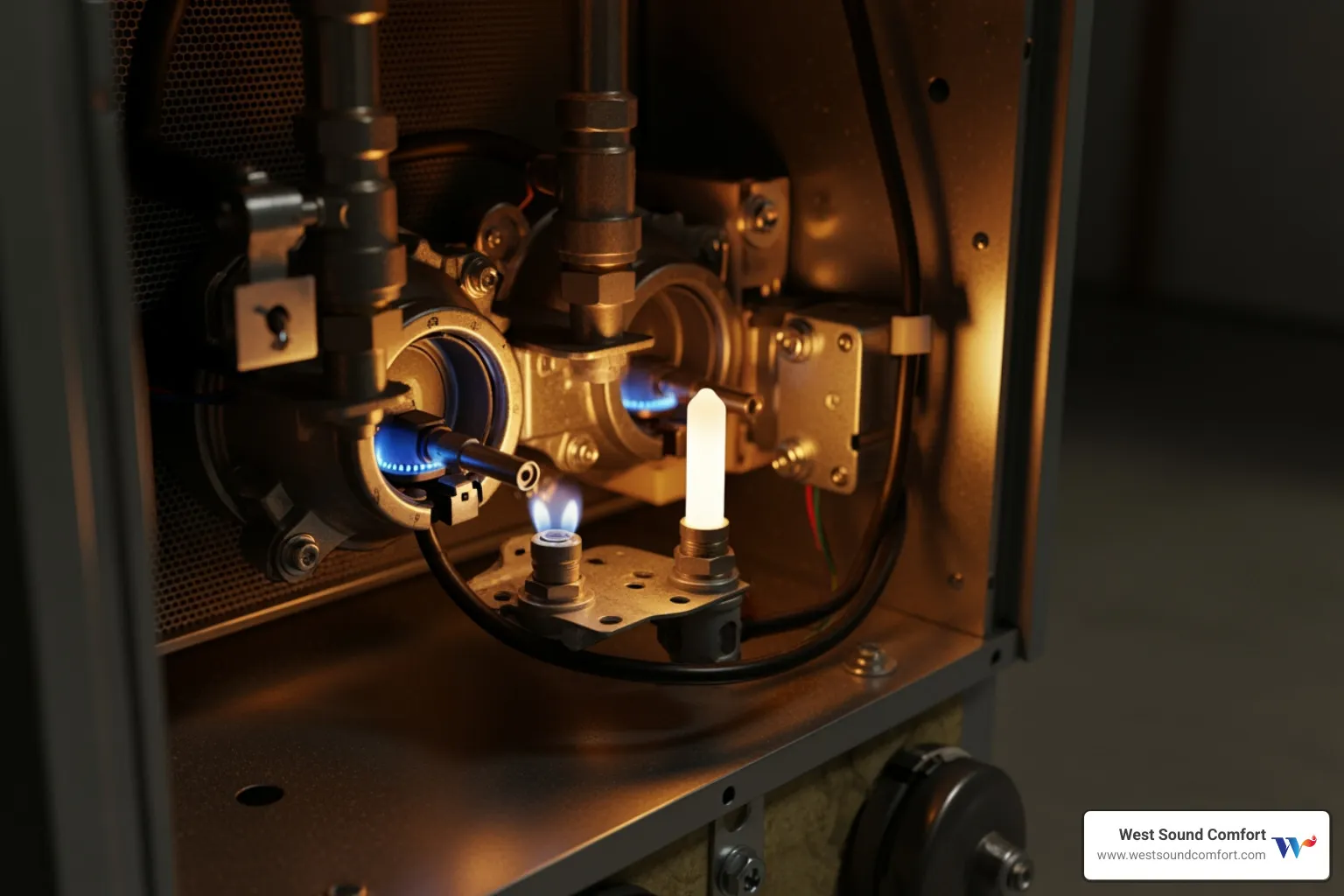
Pilot Light or Electronic Ignitor Issues
A furnace needs a flame to create heat, which is the job of the pilot light or electronic ignitor. If this component fails, your furnace will blow cold air.
Older gas furnaces use a standing pilot light—a small, continuous flame. If it goes out, you'll have no heat. You can often relight it by following the instructions on the furnace, but never attempt this if you smell gas. If the pilot won't stay lit, the problem could be a dirty pilot orifice or a faulty thermocouple. These issues require a professional technician. Our article on HVAC Broken in Gig Harbor, WA covers similar regional heating problems.
Newer furnaces use an electronic ignitor, which glows red hot to light the gas. These parts have a limited lifespan (around seven years) and will prevent the burners from lighting when they fail. Replacing an ignitor is a job for an HVAC technician.
A Dirty Flame Sensor
The flame sensor is a critical safety component that detects the flame in your burner assembly. If it doesn't sense a flame, it shuts off the gas supply to prevent a dangerous gas buildup. Over time, carbon buildup can coat the sensor, preventing it from detecting the flame. The furnace will then shut down the burners as a safety measure, even if they've lit correctly. The fan continues to run, circulating cold air.
While some homeowners can clean the sensor (after turning off the power) with fine steel wool, it's a delicate component. If cleaning doesn't solve the problem, the sensor may have failed and needs to be replaced by a professional.
Clogged Condensate Line
High-efficiency furnaces produce condensation that drains through a condensate line. If this line clogs with debris, water backs up. A float switch detects high water levels in the condensate pan and shuts down the furnace to prevent water damage. The fan may continue to run, circulating unheated air.
Standing water near your furnace is a key sign of a clog. While you might clear a simple blockage, it's best to have a professional HVAC technician handle the job to ensure the line, pan, and switch are all functioning correctly.
Understanding Furnace Safety and Maintenance
A furnace blowing cold air in Tahuya, WA, can be more than an inconvenience; it can signal a dangerous malfunction. Understanding the risks highlights why regular maintenance is crucial for your family's safety, not just comfort.
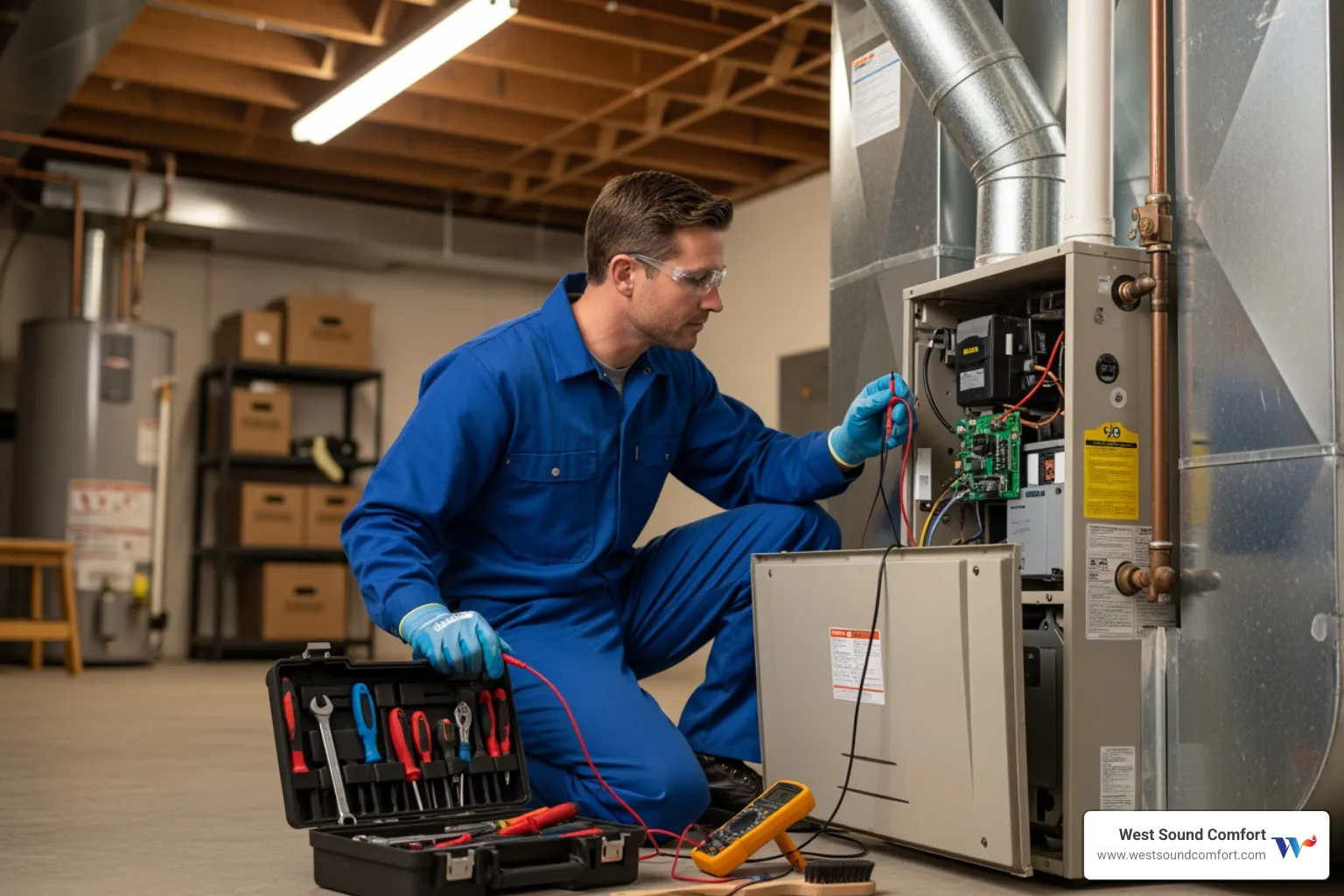
Potential Safety Risks of a Malfunctioning Furnace
While many furnace issues are minor, some pose serious safety risks that homeowners should recognize.
Gas leaks are a primary concern. If you smell gas (like rotten eggs), do not use any electronics or create sparks. Evacuate your home immediately and call your gas provider and 911 from a safe location.
Carbon monoxide is an odorless, colorless gas that can leak from a cracked heat exchanger. Symptoms mimic the flu (headaches, dizziness, nausea). If your family feels sick when the furnace is on, get fresh air immediately and seek help. Every home must have working carbon monoxide detectors.
Electrical hazards can arise from frayed wires or failing components. Sparks, a burning plastic smell, or flickering lights when the furnace starts are all warning signs. Shut off power at the breaker and call a professional immediately.
Call for help if you notice these warning signs:
- Unusual noises like banging, whistling, rattling, or grinding
- Strange smells including metallic odors, burning plastic, or gas
- Frequent cycling where the furnace turns on and off repeatedly
- Uneven heating or persistent cold spots
- Sudden spikes in your energy bills
If you notice these signs, especially with a furnace blowing cold air in Tahuya, WA, call for professional help without delay.
The Importance of Regular Furnace Maintenance
Regular maintenance can prevent up to 90% of furnace failures. An annual tune-up is the best way to avoid unexpected breakdowns and costly repairs. Like a dental checkup, an annual furnace inspection catches small problems before they become major. Technicians clean the system, inspect components, tighten connections, and test safety features.
Beyond preventing breakdowns, maintenance improves efficiency by up to 30%, lowering energy bills. It also extends your system's lifespan, protecting your investment. Most importantly, tune-ups include critical safety checks for issues like a cracked heat exchanger or gas leaks, giving you peace of mind.
Additionally, many manufacturer warranties require annual maintenance to remain valid. We offer comprehensive maintenance plans for homes in Tahuya and throughout Kitsap, Pierce, Mason, Clallam, and Jefferson Counties. Learn more about our thorough HVAC Maintenance Service in Sequim, WA, which reflects the quality we provide across the region. With 30 years of experience and a 95% customer retention rate, we are dedicated to keeping your home safe and comfortable.
When to Call a Professional for Furnace Repair
Some furnace issues require a professional. If DIY troubleshooting doesn't fix your furnace blowing cold air in Tahuya, WA, or if you suspect a serious problem, it's time to call an expert for help.
Signs You Need an Expert for Furnace Blowing Cold Air in Tahuya, WA
Calling an expert for complex furnace problems can prevent further damage, extra costs, and safety hazards. If basic checks fail to solve the problem, a professional diagnosis is needed. Our technicians have the tools and experience to find the root cause.
- Loud or unusual noises like banging, whistling, or grinding are red flags for mechanical issues that require professional attention. Our HVAC Noise Poulsbo Guide can help you identify sounds.
- A persistent burning smell (after the initial dust burn-off of the season) is a serious concern that could indicate overheating electrical parts and requires immediate service.
- Short cycling (when the furnace turns on and off repeatedly) is inefficient, strains your system, and needs a professional diagnosis.
- A sudden spike in energy bills, especially with poor heating, indicates your furnace is malfunctioning and needs an inspection.
Complex Problems Best Left to a Technician for Furnace Blowing Cold Air in Tahuya, WA
Certain furnace repairs are too complex and dangerous for DIY projects. They require the specialized tools and training of an experienced technician.
- Fuel supply problems, such as issues with the gas valve or lines, are extremely dangerous to handle yourself due to the risk of leaks and explosions. Always leave gas-related repairs to a professional.
- Electrical components and control boards in modern furnaces are complex and dangerous to repair without proper training. Technicians can safely test connections and interpret diagnostic codes.
- Heat exchanger inspection is critical, as a cracked heat exchanger can leak deadly carbon monoxide. Spotting hairline cracks is nearly impossible without the specialized cameras and tools used by professionals.
- Replacing major components like the blower motor, inducer motor, or electric heating elements involves complex electrical and mechanical work that should only be performed by a trained professional.
For these complex issues, our team provides reliable, safe solutions backed by a 5-year warranty on parts and labor. We're committed to keeping your Tahuya home warm. Visit our HVAC services page or call us today.
Frequently Asked Questions about Furnace Issues
Heating problems can be stressful. Here are answers to common questions we hear from homeowners dealing with a furnace blowing cold air in Tahuya, WA.
Why does my furnace blow cold air for a minute before the heat starts?
A brief blast of cool air before the heat starts is normal. This is part of the furnace's "warm-up cycle" or "blower delay." The furnace burners ignite and heat the heat exchanger first. The blower fan waits 30-90 seconds for the exchanger to get hot before circulating air. This intentional delay prevents it from blowing cold air through your home. Once warm, the blower circulates heated air. If the air stays cold for more than a few minutes, there is a problem that needs attention.
Can a dirty air filter really cause my furnace to blow cold air?
Yes, a clogged air filter is one of the most common causes for a furnace blowing cold air in Tahuya, WA. A dirty filter restricts airflow, causing the heat exchanger to overheat. A safety device called the high-limit switch then shuts down the burners to prevent damage. The blower fan continues to run, but since the burners are off, it circulates unheated air. This safety feature protects your furnace. You can prevent this by checking your filter monthly and replacing it every 1-3 months.
How often should I have my furnace professionally maintained?
We recommend annual professional furnace maintenance, ideally in the fall. Think of it as an insurance policy for your comfort and safety. During a tune-up, technicians inspect and clean your system, test safety features, and check for wear. This proactive approach catches small issues before they become major problems. Annual maintenance improves efficiency, lowers energy bills, extends your furnace's lifespan, and ensures safety by checking for hazards like gas or carbon monoxide leaks. Additionally, most manufacturers require annual maintenance to keep the warranty valid. Our maintenance plans make it easy to keep your system in top condition, providing comfort, safety, and peace of mind.
Conclusion
If a furnace blowing cold air in Tahuya, WA, has you feeling the chill, this guide has covered potential causes, from simple DIY fixes like checking the thermostat and air filter to more complex issues involving flame sensors or condensate lines.
The key takeaway is to prioritize safety. If you smell gas, suspect a carbon monoxide leak, or see electrical issues, shut down the system and call a professional immediately. Knowing when to call an expert is as crucial as performing simple DIY checks.
A functional furnace ensures comfort, safety, and efficiency. Regular annual maintenance prevents emergency repairs, extends your system's lifespan, and provides peace of mind.
If troubleshooting doesn't work, West Sound Comfort is here to help. With over 30 years of experience serving Kitsap, Pierce, Mason, Clallam, and Jefferson Counties, we back our work with a 5-year warranty on parts and labor. Our 95% customer retention rate reflects our commitment to service.
Don't shiver through a Tahuya winter. For repairs or a system check, our team is ready to restore warmth to your home. Explore our HVAC services or contact us today.
Featured Manufacturer
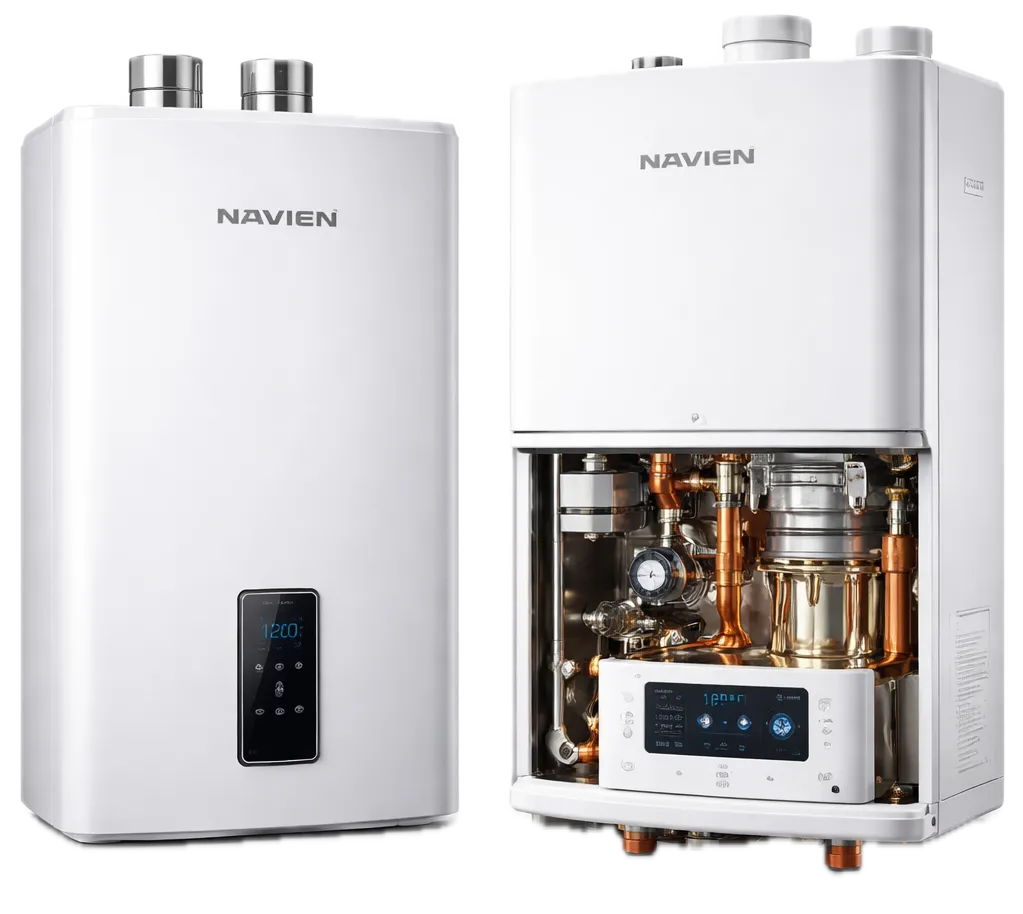
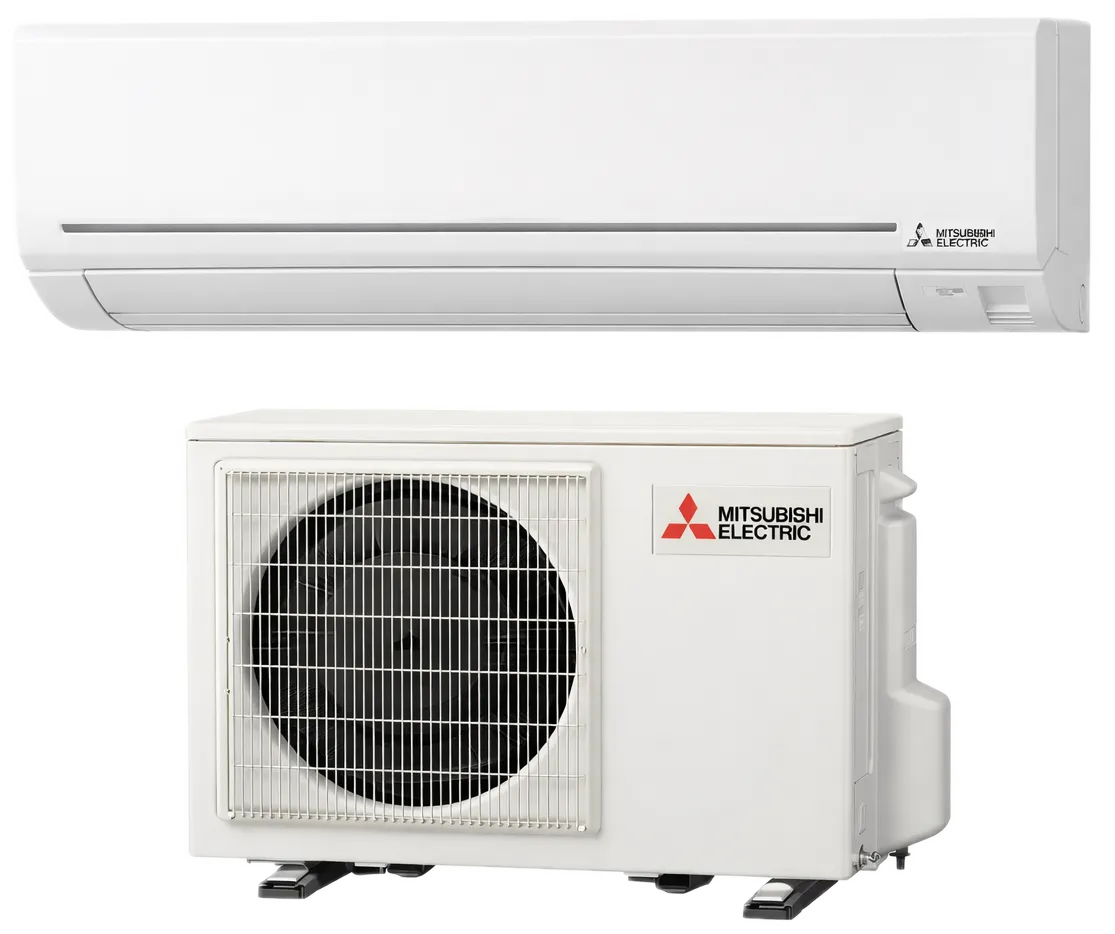
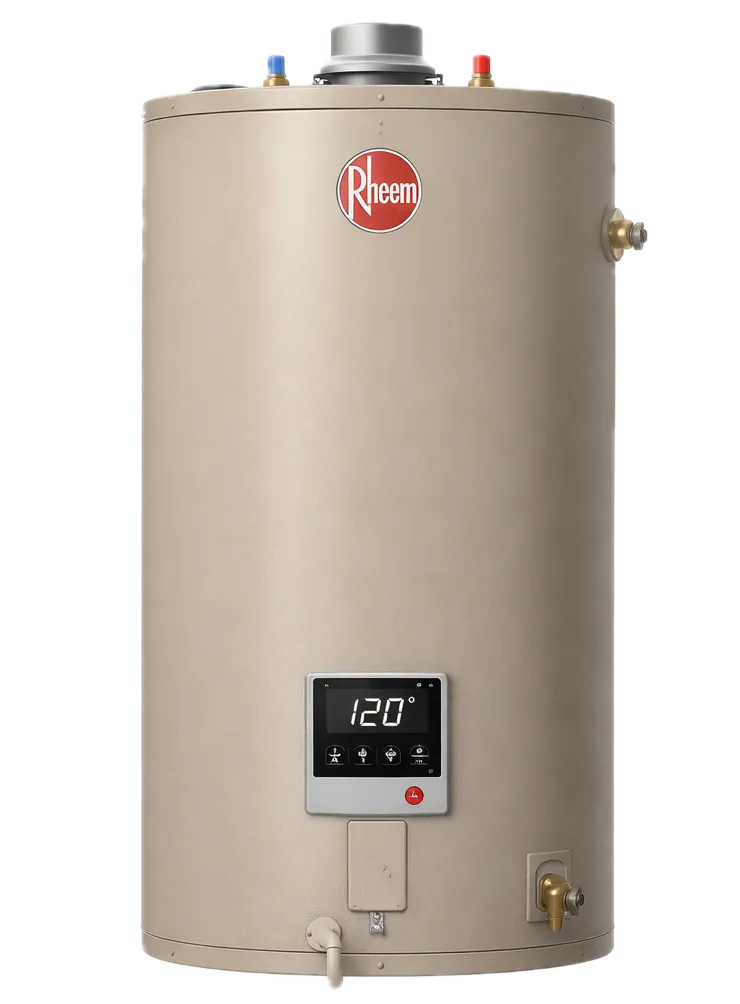



.avif)

